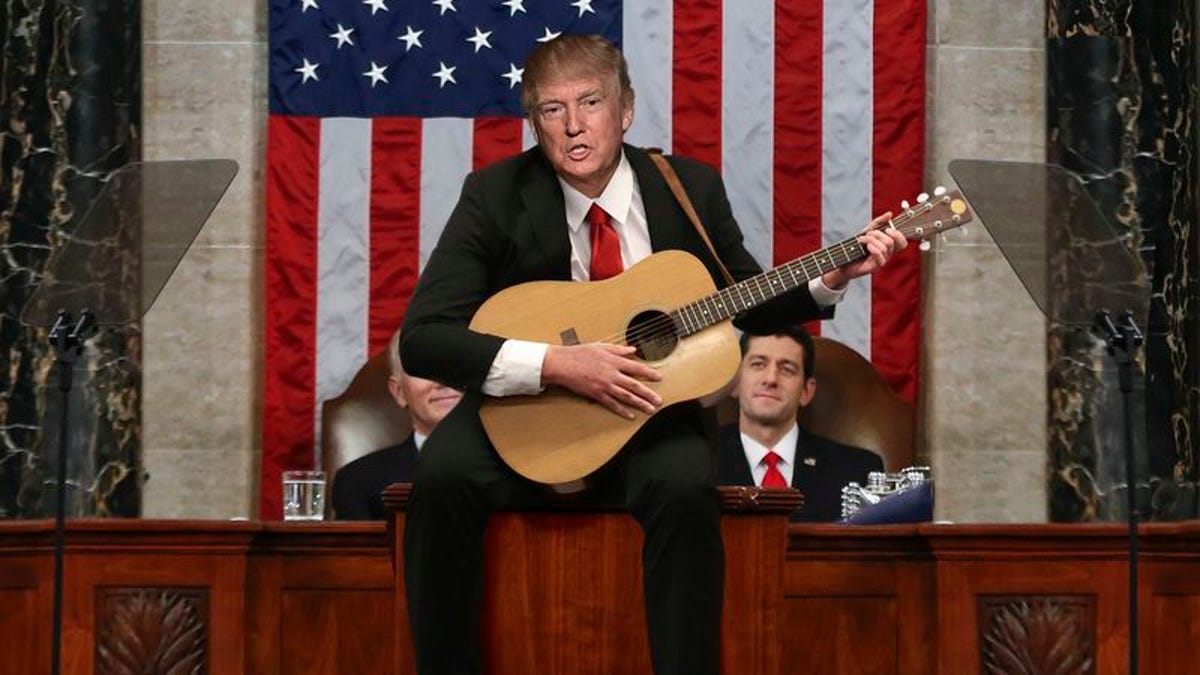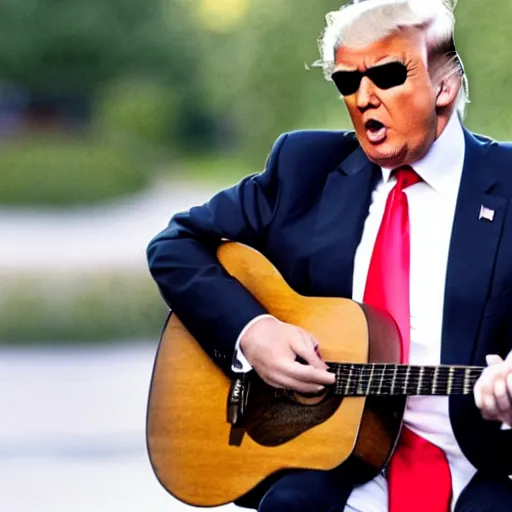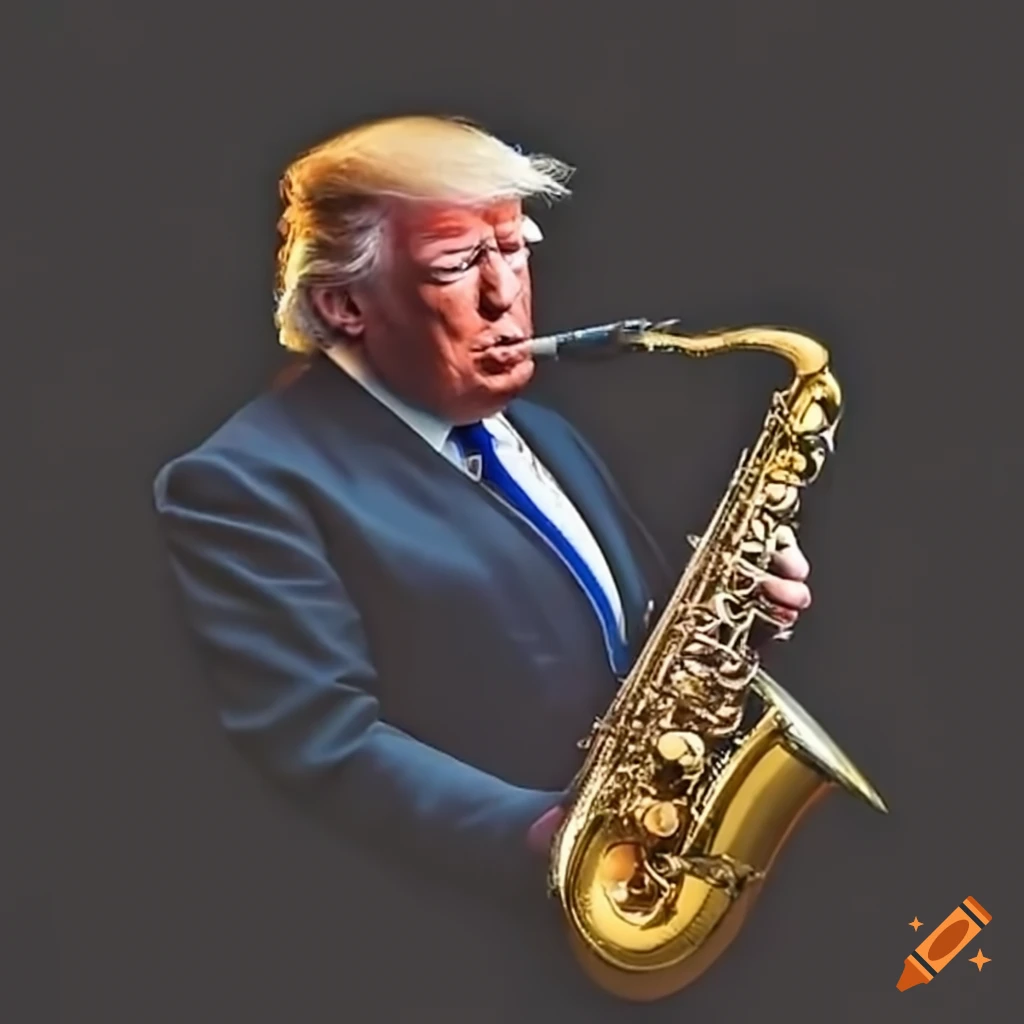Beyond Politics: Does Donald Trump Play An Instrument?
Does Donald Trump play an instrument? The question might seem trivial, perhaps even humorous, in the grand tapestry of his public persona, yet it speaks volumes about the multifaceted nature of individuals who occupy the world stage, and it is even more intriguing, considering his larger-than-life personality and penchant for performance. While not widely known for musical talents, exploring this seemingly simple query unveils intriguing insights into the former president's background and the hidden dimensions that often lie beneath the surface of public figures.
The reality, confirmed by numerous sources, including detailed biographical accounts and interviews, is that Donald Trump is not known to play any musical instrument proficiently or even casually. This isn't necessarily surprising, given his well-documented focus on business, real estate, and, more recently, politics. His public image has been carefully crafted around the persona of a dealmaker, a builder, and a leader, leaving little room for the artistic pursuits that might soften or complicate that image. However, to definitively say he never dabbled with an instrument would be speculative. It's plausible, as a child, he might have had a brief encounter with piano lessons or a childhood guitar gathering dust in an attic somewhere. But, fundamentally, music hasn't been a visible or defining part of his life narrative.
| Category | Information |
|---|---|
| Full Name | Donald John Trump |
| Date of Birth | June 14, 1946 |
| Place of Birth | Queens, New York City, USA |
| Father | Fred Trump |
| Mother | Mary Anne MacLeod Trump |
| Spouses | Ivana Trump (m. 1977; div. 1992) Marla Maples (m. 1993; div. 1999) Melania Trump (m. 2005) |
| Children | Donald Trump Jr., Ivanka Trump, Eric Trump, Tiffany Trump, Barron Trump |
| Education | Wharton School of the University of Pennsylvania (B.S. Economics) |
| Career | Chairman and President of The Trump Organization (1971-2017) 45th President of the United States (2017-2021) |
| Business Ventures | Real estate development, hotels, casinos, golf courses, media, and entertainment |
| Political Party | Republican |
| Net Worth (Estimate) | Varies; Billions of USD (Sources: Forbes, Bloomberg) |
| Known For | Real estate mogul, television personality (The Apprentice), and 45th President of the United States. |
| Official Website | donaldjtrump.com |
What is evident, however, is his undeniable appreciation for performance. Trump's career, particularly his time on television with "The Apprentice," and even more prominently, his political rallies, showcases a natural showmanship. He understands how to command a stage, how to engage an audience, and how to deliver lines with maximum impact. This performance-oriented approach, honed over decades in the public eye, is arguably a form of artistry in itself, albeit one that relies more on oratory and theatrical presence than musical skill. Some might even argue that his rallies are a form of performance art, blending political rhetoric with entertainment to create a unique and highly effective form of communication. His communication style, be it intentional or accidental, can be considered unique in its own way. It has garnered attention from many media groups.
- Movierulz 2025 Watch Latest South Indian Movies News
- Streaming Guide Find Movies Shows In India Plus Alternatives
Consider the analogy of a conductor leading an orchestra. While the conductor may not play every instrument, they possess a deep understanding of the music, the individual instruments, and how to orchestrate them into a cohesive and powerful whole. Trump, in his various roles, has similarly acted as a conductor, bringing together diverse elements – businesses, projects, political movements – and shaping them according to his vision. This leadership role demands a certain level of artistic vision, even if it doesn't involve playing a traditional instrument. He has been considered a driving force of the modern republican party. He has successfully brought together all sorts of people from different backgrounds.
Furthermore, the absence of musical talent in the traditional sense doesn't preclude an appreciation for music. It's entirely possible, and even likely, that Trump enjoys listening to music, attending concerts, or appreciating the role of music in cultural events. Many individuals who don't play instruments themselves derive great pleasure from the musical arts, finding solace, inspiration, or simply entertainment in the melodies and rhythms created by others. His exact musical tastes remain somewhat opaque. There are no readily available accounts of him discussing favorite composers or genres in detail. However, given his affinity for patriotic displays and grand spectacles, it's reasonable to assume he appreciates music that evokes a sense of national pride or provides a dramatic backdrop for events. Songs from the likes of Lee Greenwood or selections from the American songbook would not be out of place at his events.
The broader point here is that focusing solely on whether someone plays an instrument offers a limited perspective on their overall creativity and artistic sensibilities. Artistic expression manifests in countless forms, from painting and sculpture to writing and architecture, and even to the strategic maneuvering of a business deal or the crafting of a political speech. Trump's chosen arenas – real estate, media, and politics – have provided him with ample opportunities to exercise his creative vision, albeit in ways that are distinctly different from playing a musical instrument. The art of negotiation, for example, requires creativity, improvisation, and a keen understanding of human psychology. Building a skyscraper demands a vision, a sense of scale, and an ability to transform abstract ideas into tangible realities. Even political campaigning, with its carefully orchestrated rallies and media appearances, can be viewed as a form of performance art, albeit one with very real-world consequences. As president, many people agreed and disagreed with his styles and methods, but it cannot be denied that they were highly effective in galvanizing his support base.
- Movierulz 2025 Your Guide To Telugu Movies Updates
- Watch Kannada Movies Online 2025 Releases Where To Stream
Moreover, the question of musical ability often gets intertwined with perceptions of intellect and personality. There's a common misconception that individuals who excel in the arts are somehow more sensitive, more empathetic, or more intellectually refined than those who pursue more pragmatic fields. While there may be some correlation between artistic inclinations and certain personality traits, it's dangerous to generalize. Individuals from all walks of life possess a diverse range of talents and interests, and judging someone solely on their musical abilities, or lack thereof, is both unfair and inaccurate. Someone can be extraordinarily skilled at business, negotiation, or leadership without necessarily possessing the ability to play a Mozart sonata. He has been often praised for his business acumen.
It's also important to consider the cultural context in which musical ability is valued. In some societies, music is an integral part of daily life, with individuals of all ages participating in musical activities. In other societies, music is viewed more as a form of entertainment or professional pursuit, with less emphasis on widespread participation. The United States, with its diverse cultural landscape, falls somewhere in between. While music education is often included in school curricula, its importance varies from district to district, and many individuals grow up without ever receiving formal musical training. Trump, raised in a business-oriented family in New York City, likely had less exposure to music education than someone from a more artistically inclined background. The city is well known for it's business and entrepreneurial landscape.
Ultimately, the question of whether Donald Trump plays an instrument is less about musical ability and more about challenging our assumptions about public figures and the diverse ways in which creativity manifests itself. While he may not be able to play the piano or the guitar, he has undoubtedly demonstrated a talent for performance, negotiation, and leadership, skills that have propelled him to the highest echelons of business and politics. His legacy is complex and multifaceted, encompassing both triumphs and controversies, but one thing is certain: he has left an indelible mark on American society, regardless of his musical inclinations. The modern Republican party, for better or worse, has been reshaped in his image.
Furthermore, the public's fascination with the personal lives of prominent figures often leads to the scrutiny of seemingly trivial details. Whether it's their favorite food, their hobbies, or their musical preferences, the public seeks to understand the individuals behind the titles and accomplishments. This desire for connection is understandable, as it humanizes these figures and makes them more relatable. However, it's important to remember that public figures are still individuals with private lives, and their personal preferences do not necessarily reflect their professional abilities or their overall character. Trump, like any other public figure, is entitled to his privacy, and his musical tastes, or lack thereof, should not be used as a basis for judgment. This is especially true in an era of intense media scrutiny and social media commentary.
In conclusion, while the answer to the question "does Donald Trump play an instrument" is a resounding no, the inquiry itself provides a valuable opportunity to explore the multifaceted nature of creativity, the diverse ways in which individuals express themselves, and the often-misguided assumptions we make about public figures. Trump's lack of musical ability does not diminish his accomplishments in business, media, or politics, nor does it preclude him from appreciating the musical arts in his own way. His legacy is complex and controversial, but it is undeniable that he has left an indelible mark on American society, regardless of his musical inclinations. The question is intriguing, but ultimately, the answer is less important than the broader insights it provides into the nature of creativity, leadership, and the public perception of prominent figures. Whether one admires or dislikes him, he remains a figure of immense public interest and debate.
Let's delve deeper into the potential reasons why music might not have been a significant part of Donald Trump's life. Firstly, consider his upbringing. Fred Trump, his father, was a successful real estate developer who instilled in his son a strong work ethic and a focus on business. The Trump household likely prioritized financial success and entrepreneurial pursuits over artistic endeavors. While there's no evidence to suggest that the Trumps actively discouraged artistic pursuits, it's plausible that music simply wasn't emphasized or encouraged in the same way that business acumen was. Fred Trump's influence on Donald's early life cannot be overstated.
Secondly, Trump's personality and ambition may have played a role. He's always been known for his drive, his competitiveness, and his relentless pursuit of success. These qualities, while essential for achieving great things, may have left little time or inclination for activities like learning a musical instrument, which require patience, discipline, and a willingness to practice for hours on end. Trump's focus has always been on achieving tangible results, and music, with its more abstract rewards, may not have appealed to his pragmatic sensibilities. His need to be “the best” may have also contributed. Learning an instrument requires time and dedication to improve, and if Trump felt he couldn't immediately excel, he may have shied away from it.
Thirdly, the social circles Trump frequented throughout his life may have influenced his lack of musical involvement. He's always moved in circles of business leaders, celebrities, and politicians, where conversations likely revolved around deals, investments, and power, rather than music or the arts. While these circles may have included individuals who appreciated music, it's unlikely that music was a central topic of discussion or a common activity. The cultural norms of these circles may have simply not prioritized musical pursuits. His association with the world of professional wrestling, for example, placed him in a world of spectacle and entertainment but not necessarily one focused on musical cultivation.
Fourthly, and perhaps most simply, Trump may simply not have had an innate interest in music. Not everyone is drawn to music, and there's nothing wrong with that. Some people find fulfillment in other areas of life, such as sports, science, or literature. Trump's passions have always been focused on building things, making deals, and achieving success in the business world. Music may simply not have resonated with him on a personal level. It's also possible that he tried learning an instrument at some point but didn't enjoy it or didn't have the aptitude for it. Not everyone is naturally gifted at music, and forcing oneself to pursue something that doesn't bring joy is unlikely to be a rewarding experience.
It's also worth noting that Trump's age may be a factor. He was born in 1946, a time when music education wasn't as widespread or as accessible as it is today. While music was certainly a part of American culture in the mid-20th century, it wasn't necessarily emphasized in schools or in middle-class families. Trump's generation may have had fewer opportunities to learn musical instruments than subsequent generations. The rise of rock and roll in the 1950s and 1960s may have sparked some interest in music among young people, but it's unclear whether Trump was ever drawn to that genre. He seems to prefer more traditional and patriotic forms of music.
However, one could argue that his rallies, particularly during his presidential campaigns, incorporated elements of musical performance. The carefully curated playlists, the dramatic entrances with accompanying music, and the use of music to create a specific mood or atmosphere all suggest a degree of awareness of the power of music to influence and engage an audience. While Trump may not have been personally involved in selecting the music, his campaign team clearly understood its importance in shaping the overall experience. These events were carefully crafted to evoke emotions of patriotism, excitement, and enthusiasm, and music played a key role in achieving that effect. The choice of songs often reflected Trump's political messaging and his appeal to certain segments of the population.
Furthermore, Trump's background in reality television may have influenced his understanding of performance and entertainment. "The Apprentice" was a highly produced show that relied heavily on music and sound effects to create drama and suspense. Trump, as the star of the show, was undoubtedly aware of the impact of music on the overall viewing experience. This experience may have given him a greater appreciation for the power of music to engage an audience, even if he didn't personally play an instrument. The show's theme song, for example, became synonymous with Trump's image and his message of ambition and success.
In conclusion, while Donald Trump may not play a musical instrument, his lack of musical ability should not be interpreted as a sign of any deficiency. He possesses a diverse range of talents and skills that have propelled him to great heights in business, media, and politics. His appreciation for performance, his understanding of the power of music to influence an audience, and his overall success in life demonstrate that creativity and artistic expression can manifest in many different forms. The question of whether he plays an instrument is ultimately less important than the broader insights it provides into the nature of creativity, leadership, and the public perception of prominent figures. His legacy will continue to be debated for years to come, but his impact on American society is undeniable.



Detail Author:
- Name : Prof. Hermann Keebler MD
- Username : ayundt
- Email : kilback.giovanni@ernser.com
- Birthdate : 1992-01-04
- Address : 81534 Littel Key Sporerville, ME 12631
- Phone : +18703469844
- Company : Bartoletti PLC
- Job : Engraver
- Bio : Dolores nam qui expedita sequi in magni voluptas. Possimus corporis est totam officiis. Omnis libero quibusdam laboriosam inventore placeat.
Socials
facebook:
- url : https://facebook.com/colton.ondricka
- username : colton.ondricka
- bio : Alias in aut voluptatem impedit hic.
- followers : 347
- following : 2031
twitter:
- url : https://twitter.com/colton.ondricka
- username : colton.ondricka
- bio : Vel et exercitationem molestias reprehenderit id ut iusto. Mollitia beatae eligendi eaque officiis. Architecto ut saepe cupiditate ex aliquid dolores quae.
- followers : 5297
- following : 705